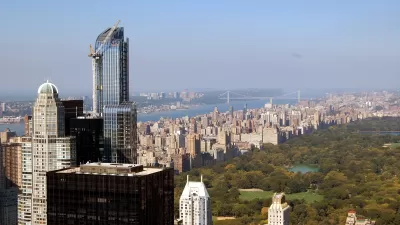Unlike the United Sates, Canada, and Great Britain, few countries raise substantial revenues from property taxes. The Economist argues that property taxes are among the most efficient, stable, and progressive forms of taxation and should be embraced.
Property taxes are among the oldest forms of taxation, but these days they "are much less prominent than they once were," says The Economist. "To fund rising government spending, far more cash is raised from other sources, particularly income taxes, payroll taxes and value-added taxes (see left-hand chart)."
"A new study [PDF] by John Norregaard of the International Monetary Fund suggests that the average rich country, including all levels of government, raises under 5% of total tax revenue from annual levies on land or the buildings on it. The norm in middle-income emerging economies is lower still, at around 2% of all tax revenue (see right-hand chart)." In the United States, property taxes account for 17% of all government revenue, for comparison.
"That’s a pity," the authors argue. "Taxing land and property is one of the most efficient and least distorting ways for governments to raise money. A pure land tax, one without regard to how land is used or what is built on it, is the best sort. Since the amount of land is fixed, taxing it cannot distort supply in the way that taxing work or saving might discourage effort or thrift. Instead a land tax encourages efficient land use."
FULL STORY: Levying the land

Alabama: Trump Terminates Settlements for Black Communities Harmed By Raw Sewage
Trump deemed the landmark civil rights agreement “illegal DEI and environmental justice policy.”

Study: Maui’s Plan to Convert Vacation Rentals to Long-Term Housing Could Cause Nearly $1 Billion Economic Loss
The plan would reduce visitor accommodation by 25% resulting in 1,900 jobs lost.

Why Should We Subsidize Public Transportation?
Many public transit agencies face financial stress due to rising costs, declining fare revenue, and declining subsidies. Transit advocates must provide a strong business case for increasing public transit funding.

Wind Energy on the Rise Despite Federal Policy Reversal
The Trump administration is revoking federal support for renewable energy, but demand for new projects continues unabated.

Passengers Flock to Caltrain After Electrification
The new electric trains are running faster and more reliably, leading to strong ridership growth on the Bay Area rail system.

Texas Churches Rally Behind ‘Yes in God’s Back Yard’ Legislation
Religious leaders want the state to reduce zoning regulations to streamline leasing church-owned land to housing developers.
Urban Design for Planners 1: Software Tools
This six-course series explores essential urban design concepts using open source software and equips planners with the tools they need to participate fully in the urban design process.
Planning for Universal Design
Learn the tools for implementing Universal Design in planning regulations.
Caltrans
Smith Gee Studio
Institute for Housing and Urban Development Studies (IHS)
City of Grandview
Harvard GSD Executive Education
Toledo-Lucas County Plan Commissions
Salt Lake City
NYU Wagner Graduate School of Public Service





























